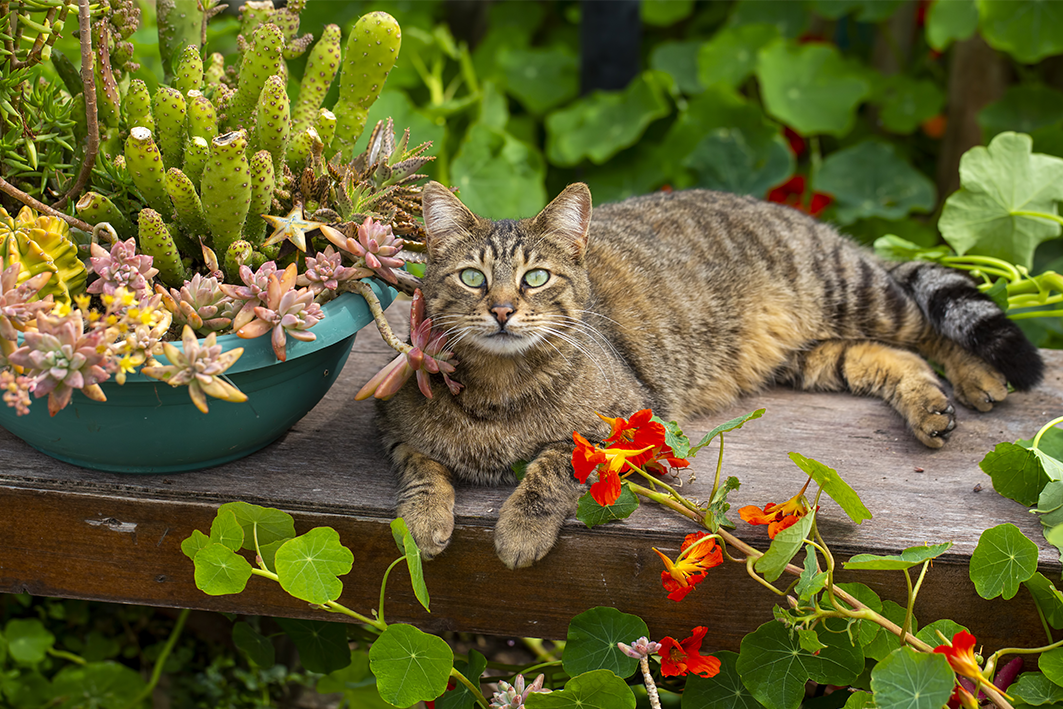Safeguarding Against Outdoor Pet Toxins

As we settle in for another season of tinkering around in our garage and backyard, it’s important to keep your pet’s safety in mind. Many of the chemicals we commonly use for outdoor maintenance can injure or even kill a pet. Although you may not expect your pet to get into trouble in your garage or yard, pets can be known to eat just about anything, so protecting them from outdoor pet toxins is essential.
Common Outdoor Pet Toxins
The spring thaw is the perfect time to review your lawn and garden supplies. Always store these supplies out of your pet’s reach and properly dispose of empty containers.
Rodenticides/Insecticides
No one wants mice or rats inside their home or garage. However, rodenticides and insecticides are some of the most dangerous toxins. Anything designed to kill a rodent can also kill a dog or cat. Even if you keep the poison out of reach, a rodent may move the nuggets or granules to a different location that your pet could have access to. Whenever possible, use a nontoxic method for rodent control, such as traps or ultrasonic devices; you’ll still need to put these in places your pet cannot reach.
Compost Toxins
Compost bins can contain coffee grounds, onion peels, and other remnants of foods your pet shouldn’t be eating. Decaying organic matter and moldy food could also sicken your pet. Keep compost bins securely covered at all times to prevent your pet from getting into them.
Blood and Bone Meal Fertilizers
Gardeners often use these soil amenders to improve the yield of their flowers or vegetables. These high-nitrogen compounds can have serious side effects if ingested by pets, including nausea, bloody vomit, diarrhea, lethargy, pancreatitis, and intestinal obstruction (in the case of bone meal ingestion or ingestion of the packaging). Fertilizers containing iron also put pets at risk of iron poisoning, so the same cautions apply.
Herbicides
Exposure to herbicides, such as glyphosate, pyridine, 2, 4-D, and others, can have serious health consequences for pets. Gastrointestinal distress, tremors, central nervous system depression, and aspiration pneumonia can result.
Cocoa Bean Mulch
Chocolate production creates this fragrant mulch, which landscapers often use for its lovely color and scent. Unfortunately, cocoa bean mulch still contains theobromine and caffeine, two compounds that make chocolate extremely toxic to animals. This product’s delicious aroma especially attracts dogs, who may ingest enough to cause toxic side effects.
Landscaping Concerns
Outdoor flowers and shrubbery are beautiful additions to any home. But making sure your greenery is pet-safe should be high on your list of priorities. Before adding new landscaping, make sure the plants you choose are not on the ASPCA’s list of toxic plants. Some of the most common toxic landscaping plants include:
- Lilies (all parts of the lily plant are extremely toxic to cats)
- Rhododendrons
- Azaleas
- Crocus
- Oleander
- Laurel
A Word About Antifreeze
Antifreeze is the most dangerous, yet, common chemical you’re likely to have on your property. Ethylene glycol, the main ingredient in antifreeze, has a sweet odor and taste that many pets find irresistible. Even small amounts of the substance can kill a pet. Just two teaspoons for a cat and two tablespoons for a medium-sized dog. It’s critical that leftover antifreeze be tightly capped and stored out of reach. Be sure to thoroughly clean up any spills or leaks immediately. Consider switching to a product containing propylene glycol, which is less toxic to pets but still needs to be stored out of their reach.
When in doubt over a toxin, you can contact the Animal Poison Control for specific toxin recommendations. This is a 24-hour online chat service.
The following two helplines are also available, although a fee will be charged for your call:
Pet Poison Helpline: 1-800-213-6680
The American Society for the Prevention of Cruelty to Animals Animal Poison Control Center: 1-888-426-4435
These help centers are specifically for pets and not the same as human poison control. Be sure to record any case number assigned to your inquiry in case our medical team or an after-hours pet ER needs to reference it.
The team at Lone Tree Veterinary Medical Center is here 6 days a week to treat your pet in the event of an emergency during our regular business hours. Should you need help outside our business hours, our phone message will direct you to the after-hours pet ERs that we refer to. Please don’t hesitate to contact us with additional questions about outdoor pet toxins.



